One thing that has always fascinated me about human existence is the continuous phenomenon of facing struggles and overcoming them. It is like a rollercoaster ride that even the best of us can’t avoid. And by the looks of it currently software developers seem to be facing a downturn as the recession and layoffs are hitting the IT industry quite hard.
We once considered the software industry immune to the ups and downs of the economic fluctuations due to the high skill set required to enter the industry and the equally rewarding pay and benefits packages that developers boast about. Yet here we are in 2023 emerging from a pandemic, combatting mass layoffs, high inflation, hiring freezes, while worrying about AI rearing its disruptive head across industries.
All of the above events happening simultaneously can be quite overwhelming for any normal person or society in general; but we are not here to stew in silence while these external events rock our boats. We are here to discuss and overcome these turbulent times together as a community, reminding ourselves that even clouds come with a silver lining.
However, these layoffs make one thing loud and clear: the software industry is not immune to layoffs or recessions.

Software - An Industry Vulnerable to Layoffs and Recessions
The first dot.com bubble burst in 2000 saw massive layoffs. However, since then the field of software engineering has been considered a safe bet. In fact, a career in software has proven to be a stable source of income for many as demand for software engineers has only grown exponentially in the past decade.
Additionally, since software engineering is a purely technical field that requires intense education and training, the high investment of money and effort yield high returns, becoming a lucrative career path for many.
And since we live in a modern world full of tech wonders integrated in each layer of our life that is only set to deepen, we find ourselves thinking that software developers have got it good. And while there may be some truth in that as well, one needs to remember that you can’t always succeed in your career by achieving a degree, you need to actually be proficient in your technical skills and a good software engineer is a scarce resource.
Forgetting that in the end software developers are also like normal employees ruled by the principles of global demand and supply, might just be the reason we were all so perplexed by the mass layoffs from tech giants starting mid 2022 and continuing on in 2023.
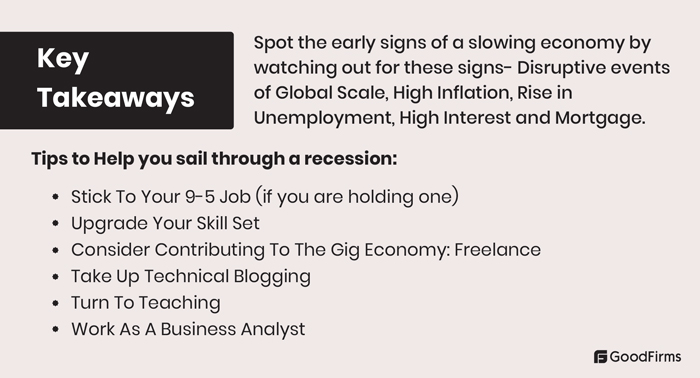
What Triggered The Chain Of Mass Layoffs
The Covid-19 pandemic was a tough period for everyone and while the world was quick to adapt the new model of working- Work From Home or Work From Anywhere, the workers were quite reluctant to get back to the old model of working from office once this new and improved working regime was unlocked that allowed them to have a better and more stable work-life balance.
Now we must consider that although the pandemic proved deadly to many businesses, it took many others to new heights. Specifically online markets such as e-commerce peaked during the pandemic since the public didn’t have access to offline shopping.
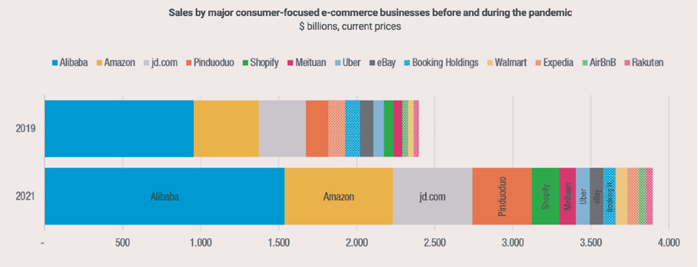 (Source: UNCTAD)
(Source: UNCTAD)
Experts believe that this is a major contributor to the mass layoffs we are facing today.
Since IT and Ecommerce were flourishing during the pandemic, the workforce moved online due to quarantine precautions, and companies started hiring in droves. Apart from that, experiencing the difficulties of the pandemic, many companies found it cruel to reduce their workforce during the pandemic if not absolutely necessary and pushed the decision off to later, which is what we are seeing now that things have returned to normal.
Another crucial factor according to economists is the ongoing Russia-Ukraine war which has caused an economic decline by disrupting important supply chains and raising fuel costs across the globe and fanning the flames of inflation.
Post pandemic when this online growth declined and revenues started to slow along with external factors fueling the inflation, companies realized their mistake of overhiring and had to turn to restructuring their workforce to cut their costs resulting in a chain reaction of mass layoffs across various industries but most commonly software and ecommerce.
The question arises that could these events be predicted so that the affected could have taken precautionary measures?
What Are Some Signs Of A Slowing Economy
While there is no surefire way to predict a recession, there are some signs of a slowing economy that can act as your early warning system. I feel that by spotting the below 5 economic indicators, one can be well prepared to face a recession irrespective of the industry they are currently employed in.
1. Shocking and disruptive events like the covid-19 pandemic or a war like the one we are currently facing (Russia-Ukraine). These large scale and external events disrupt the usual cycles and routes of the supply chain which inadvertently slows down production and manufacturing causing a slack in global supply.
2. Reduced consumer spending due to high inflation. Higher prices de-motivate the general public from spending their extra income on impulse purchases, instead re-modeling the budget for necessity items with inflated prices. This lowers the demand in the economy as people spend less and save more.
3. Unemployment is on the rise. High prices, along with layoffs and slow hiring also indicate a recession on the horizon as corporations try to lower their overhead costs by reducing headcount. This fuels job insecurity and ambiguity, again adding to lower spending and tightening of the purses.
4. High interest rates are brought about by federal banks to ensure that people are demotivated from taking out loans to feed their excessive lifestyles and stick to saving money instead of spending it. Real estate market slows down as people are reluctant to take the risk of a mortgage in a financially downturned environment.
5. Manufacturing and production activity also slows down as the overall demand falls since people are not buying goods and choosing to save their money.
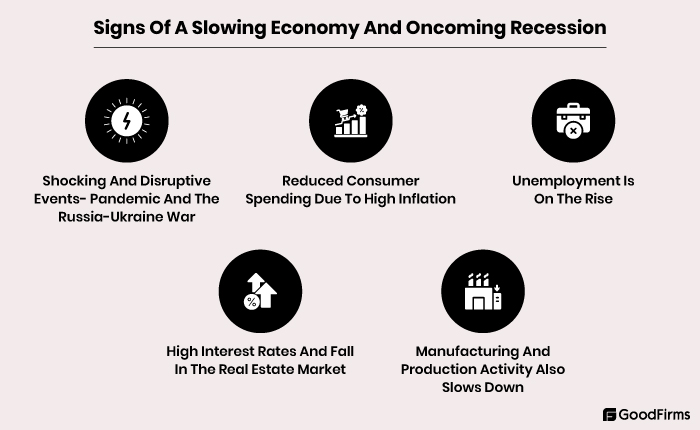
The Resilience Of The IT Industry: Repositioning of the Techies
Following the impact of the pandemic and the Russian-Ukrainian war crisis, business was greatly affected in the IT sector due to multiple reasons, overstaffing and under utilization of resources being the primary reasons.
The Result: As per Forbes, by October 2022, the major tech companies in the world, commonly known as FAANG (Facebook, Apple, Amazon, Netflix, and Google) along with Tesla, had collectively lost over $3 trillion in market value.
Zuckerberg explained in his blogpost that job cuts were their last resort to their cost-cutting strategy as their prediction that the accelerated shift to online from offline would be permanent was proving to be wrong.
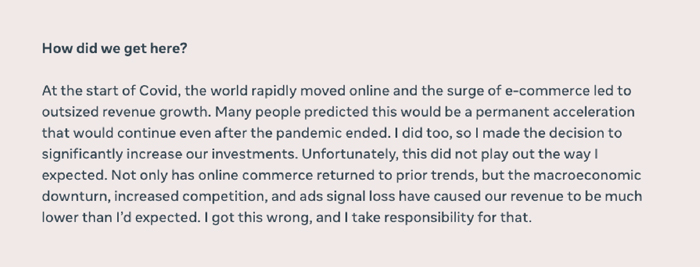
(Source: Meta)
Meta then announced a massive reduction in their workforce by laying off 11,000 of their employees across Facebook, Instagram and Whatsapp. This news triggered a chain of mass layoffs being announced by almost all tech giants across the globe. The numbers themselves sound unreal and big enough to cause a panic in the minds of the workers about their own prospective firing.
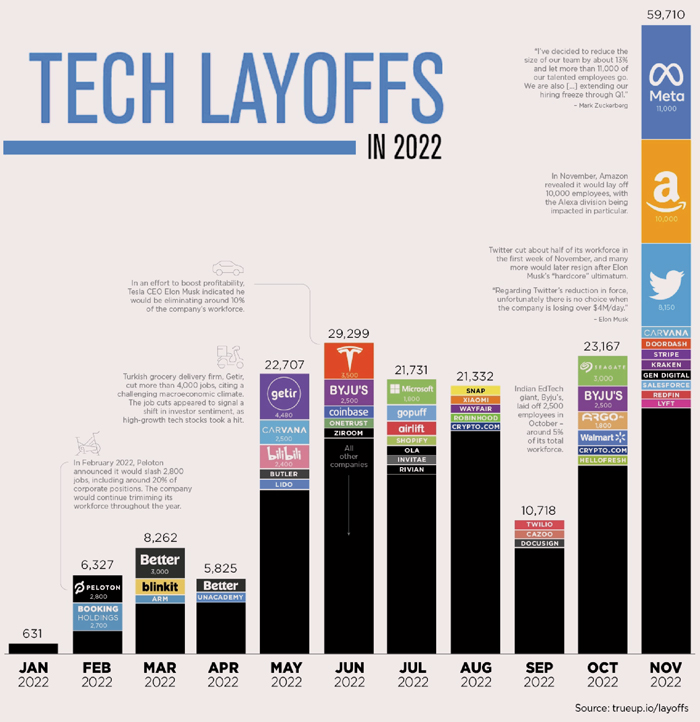
However, despite this overwhelming number of layoffs from giant MNC’s of reputable and skilled workforce, the surprising news is that software development still remains the most high paying and in demand job in the global talent market.
This indicates that rather than the downfall of tech, that most people seem to be interpreting from the news of layoffs, it is simply a move away from idolizing the tech giants as the end-all fruit of labour for software developers. Engineers can now take a step back and re-evaluate their career decisions. Many analysts are observing that rather than a sign of tougher times for developers, this might simply be a re-distribution of intelligence and resources.
John Chadfield, United Tech and Allied Workers Union Britain said, “Since COVID, really, what I’ve noticed is tech workers of all stripes — but particularly those with experience — no longer want to work for the Facebooks and the Googles and the Microsofts. It’s just not an aspiration anymore.”
He further insinuated that software engineers might now prioritize working for smaller companies that can offer them remote work flexibility, four-day workweeks and a better quality of life. Others might even turn to uber-flexible freelance work.
Since a job at one of these tech giants meant job security and custom curated benefit packages, many youngsters were inclined to choose them over working for companies that specialized in other non-tech areas; but since now that bubble has been burst, the youth might be more open to working for different industries as every single company has a website and an app for its products and services nowadays so there is always scope.
How To Stay Ahead Of The Curve: Preparing For Tough Times
“The fact is, there are Fortune 500 companies that have been founded during recessions.” ~ Marianne Williamson
Talented and highly skilled people will find other sources of income and job opportunities in no time, but a dark fact of the matter is that most of the workers that were laid off in these past months were contractual employees.
I recently saw a post on my LinkedIn that outlines the story of Peeta (fake name for anonymity) a video game developer that had switched fields from developing video games mainstream to a well paying job at a tech giant. He was recently laid off through a simple email and quite flabbergasted by the news as his main reason for switching fields was job security and stability.
This incident came to him as a soul-searching moment and gave him a chance to revert to his main passion of building video games instead of sticking to traditional tech.
Reading his story inspired me to curate this checklist so that it can help software developers all over the world, whether residing and working in Washington or in India, stay prepared for the worst case scenario during this recession and stay ahead of the curve.
1. Stick To Your 9-5 Job (if you are holding one)
If you have a steady job, stick to it. Right now is not the time to go job hopping and lose the stable income that can keep you and your family afloat amidst rising inflation. Poor planning and reasons will only end up stabbing you in the back as it is common knowledge that fresh hires are the first to go during cost-cutting in any company. This rule applies to almost all companies irrespective of their location.
You must also work on building a good network of resources on professional sites such as LinkedIn so that you can rely on them to share and give you leads in case you face the axe from your company.
Key Takeaway: A stable 9-5 can be a blessing in disguise over a high-paying job with no security.
2. Upgrade Your Skill Set
Take this time to upgrade your skills and gain new knowledge. As a professional you must always stay at the top of your game and have information about the latest developments in your fields. It is understandable how this can take a backseat when you have deadlines to meet and a work-life balance to maintain.
So use this time to take the task of updating your skills seriously. Learn that new language that you always thought would open new doors for you and get the additional certification that will help you get a promotion faster and add stars to your portfolio.
According to a Burning Glass report in 2022 the latest most desired skills in a software developer are in the fields of AI, Machine Learning, Cloud Computing, Azure, and even AWS.

Key Takeaway: Learn a new skill after market research and buff up your resume.
3. Consider Contributing To The Gig Economy: Freelance
There was recently a heated debate about moonlighting in India and Infosys even fired 300 employees after discovering they did dual work. Unless the privacy of the company is breached, freelancing should be allowed given the fragile constitution of the economy and lack of job security from the companies’ side.
However there is no one scale by which this topic can be judged as it has to be case by case depending on the professional ethics of both the company and the employee. Freelancing should always be an option for professionals with such niche skills as long as it is not infringing on the quality of their other work commitments. It is also an excellent source of side income that can cushion the news of a sudden lay off.
Many software professionals turn to freelancing these days instead of working the old and boring 9-5 routine. You can work on multiple projects at the same time and have greater exposure to using new technologies as well. The only downside is that you have to work hard to build a good brand of yourself to keep the work flowing in.
Key Takeaway: Always have a passive source of income for tough times.
4. Take Up Technical Blogging
As a person with a deep and working knowledge of technical products and services you can easily take up blogging and put your 5 cents out on the latest tech news. Depending on your narrative this can build a nice and loyal audience for your work that can boost your portfolio during interviews and also help you earn a good passive income.
There is always a need amongst people to explain the new tech in layman’s language and oftentimes this is exactly what tech bloggers and vloggers do. They make a website or a social media account, such as a YouTube channel, and earn handsomely if their videos get a certain amount of views and engagement ratios.
This can be an excellent use of your knowledge.
Key Takeaway: Sharing your tech knowledge can be the best side hustle for a steady passive income.
5. Turn To Teaching
You can always turn to teaching your subject of specialization if you are done with the corporate. Not only is teaching a reputable career, it is now also quite attractive due to the working flexibility provided by online teaching resources available.
You can choose to either start your own online teaching channel, or join an online teaching business, or get a certification and become a full time professor at a university. You can shape young minds and share your wisdom on your topic of liking with your students while getting paid and having fixed working hours and lots of vacation days.
Key Takeaway: Teaching Tech is a great option for engineers facing burnout or a layoff.
6. Work As A Business Analyst
As a business analyst, you must consider how an organisation operates as a whole and come up with fresh ideas for improving operational efficiency as well as altering current business procedures. Business analysts examine every facet of an organisation, from internal problems to market success. In order to do this, they examine business data and develop plans to improve organisational structure, employee interactions, and IT procedures.
A business analyst's position entails duties similar to those of a software QA analyst. However, it's a fantastic profession to have if you are tired of creating software and want to use your communication and organisation abilities.
Key Takeaway: Alternative career options are always readily available if you are a skilled professional.
Lastly, if all else fails, you can always just completely abandon the software industry and pursue your dreams. The career you dreamt of having as a child or a teenager, whether it was a musician or a stand-up comedian (they are on rise now), or simply a writer, and try your hand in those fields while you take some time off, who knows you just might be the next Jimmy Fallon.
Closing Remarks
“Success is finding, or making, that position which enables you to contribute to the world the very greatest services of which you are capable.”
-B.C Forbes, Founder of Forbes Magazine

A lot of people will be surprised when they find out that some of the most successful businesses and brands that we know of today were founded during the last Great Recession. Jan Koum and Brian Acton, Ex-Yahoo, created Whatsapp in 2009, while software engineers Kevin Systrom and Mike Krieger created Instagram in 2010 with the vision of communicating through photos and visuals.
Mentioning these great brands is my way of reminding software engineers that although no one is completely immune from getting axed, skilled professionals still have an upperhand of choosing their own destiny with whatever they are given. So even if the software industry is not insulated from economic fluctuations, there are a lot of ways in which you can make yourself recession-proof.








